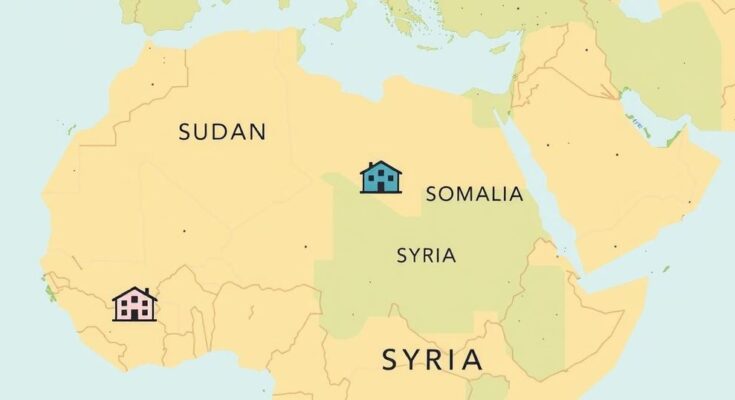The Trump administration and Israel are exploring the resettlement of Gazans in Sudan, Somalia, and Syria as part of efforts to conclude the conflict with Hamas and rebuild Gaza. President Trump has assured that no forced expulsions will occur. Various diplomatic measures are being pursued, but there are significant concerns regarding humanitarian impacts and regional stability amid the ongoing conflict and refugee crises.
The Trump administration, alongside Israeli officials, is reportedly exploring resettlement options for Gazans in Sudan, Somalia, and Syria. This initiative aims to support President Trump’s overarching objective of concluding the conflict with Hamas and facilitating the reconstruction of Gaza.
During an Oval Office meeting, President Trump clarified that no Palestinians would be forcibly expelled, despite previous remarks about potential reconstruction efforts in Gaza. He emphasized the necessity of collaborating with nations inclined towards humanitarian aid to improve conditions for the Gazan population.
Communications have occurred between Israeli and American officials with Sudan and Somalia to discuss resettlement. Furthermore, there has been implied outreach to Syria’s new interim government, though responses remain ambiguous. The official stance from Somalia indicates a lack of any formal approach by U.S. or Israeli authorities regarding Palestinian relocation.
Concerns have emerged regarding the dissemination of such information potentially heightening security threats in the region from extremist groups. The humanitarian situation in Sudan and Somalia remains precarious, with Sudan facing civil unrest and Somalia grappling with ongoing insurgency challenges.
President Trump has suggested that the departure of Palestinians from Gaza could be permanent, and he has advocated for the establishment of new safe communities for their settlement. He indicated that the conditions in Gaza render it unlivable, thus limiting prospects for return.
The United Nations has reported significant devastation in Gaza, with a high percentage of housing destroyed and massive civilian displacement following the recent conflict. Numerous Arab leaders, alongside Democratic lawmakers, condemned Trump’s resettlement idea, labeling it a form of ethnic cleansing. They proposed alternative reconstruction plans, which were swiftly dismissed by the Trump administration.
Former President Biden’s administration had previously engaged with the Syrian government prior to Trump taking office. Following Trump’s comments, Syria’s leadership condemned the proposed resettlement, viewing it as a severe violation of rights.
Policy experts have advised direct engagement with Syria’s current government to prevent Iranian influence and to effectively combat extremist movements. Israel’s military activities in Syria continue amidst ongoing tensions, with significant airstrikes targeting perceived threats.
The U.S. State Department is working towards advancing peace initiatives that foster better living conditions for both Gazans and Israelis, emphasizing the need for various policy considerations in the pursuit of a lasting solution. The possibility of relocating Gazans to other Arab nations remains a prominent consideration in these discussions, as existing refugee populations already exist in surrounding countries due to ongoing regional conflicts.
The White House, Israeli government, and National Security Council have not provided comments regarding these developments. Reports indicate that outreach efforts around resettlement have been made to Sudan, Somalia, and Somaliland, marking a significant pivot in addressing the Gaza crisis through international cooperation.
In summary, the Trump administration and Israeli officials are actively seeking resettlement options for Palestinian refugees from Gaza, targeting nations such as Sudan, Somalia, and Syria. This initiative is part of a larger strategy to foster peace and rebuild Gaza. The proposal has sparked controversy and criticism, with concerns over humanitarian implications and regional security. As discussions progress, the international community remains watchful of the potential consequences for those affected and the broader geopolitical landscape.
Original Source: www.cbsnews.com




